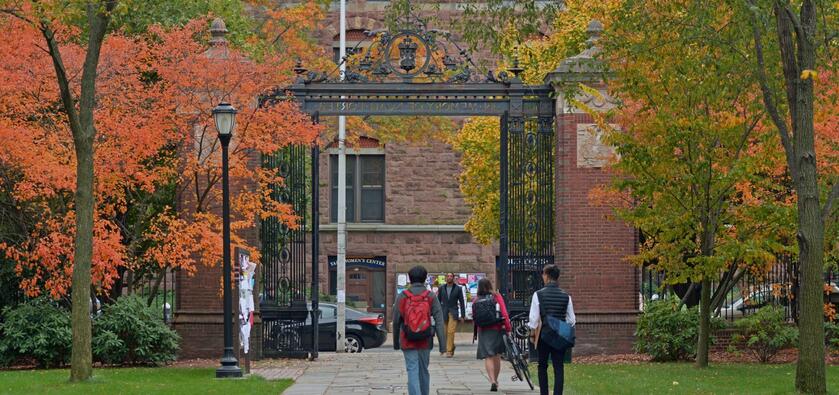Advising
You are here
Yale Visiting International Students Program has Officially Closed
The Yale Visiting International Students Program (Y-VISP) has officially closed. No applications will be accepted. Interested students are encouraged to instead check out Yale Summer Session and the Yale Non-Degree Students Program.

It is our hope and expectation that a student will make use of Yale’s many advising resources to plan their program of study. It is in the nature of a liberal arts education to ask questions and students have an important role to play in seeking advice.
Pre-Departure Briefing
We will have someome from the registrar join the mandatory Pre-Departure Briefing to discuss early course registration and academics at Yale. The briefing will be scheduled before early course registration starts.
Y‐VISP Adviser
All YVISP participants will have an adviser who is a member of the Y-VISP Steering Committee or a senior member of the CIPE team with whom they discuss their goals for their time at Yale and the classes they are considering taking. The adviser offers guidance on constructing a sensible course schedule, and helps Y-VISP students think through their plans, directing them to relevant resources. Advisers will provide initial advising before students arrive and during their time at Yale on course selection and other aspects of adjustment to their US experience and to Yale campus life. Your Y-VISP adviser will provide course advising in small groups virtually during course registration. As with College advising, advisers will propose a mid-semester and end of semester meeting with participants.
We cannot guarantee that you will be assigned a Y-VISP Academic Adviser before early course registration. You can schedule a meeting with Lauren if you need avice during early registration and don't yet have an assigned adviser.
Academic Mentor
These are members of the Y-VISP Steering Committee, Yale faculty, staff, teaching fellows, and post-docs whose academic area is close to that of individual participants. Not all participants will be assigned a mentor depending on their field of study and goals for the program and connections that Y-VISP has. During the first few weeks at Yale, Y-VISPers should request a meeting with their Academic Mentor. The goal of this meeting is for the mentor to help the Y-VISPs get to know Yale’s departments and opportunities within fields of academic interest, discuss how best to use their time at Yale to make progress with their studies, and let Y-VISPs know of Yale resources to help them achieve their goals. Mentors and participants will decide together whether to have further meetings, and it's up to the Y-VISP student to try to pave the path for the mentorship relationship they seek. Y-VISPs are welcome to set up their own mentorships with professors or other faculty and staff they find can support them. Students should note that their Academic Mentors are not experts on every course or department at Yale. Specific questions about particular courses or requirements should be directed to the relevant academic department or to the student's residential college dean.
Y-VISP Peer Liaisons
Y-VISP Peer Liaisons are Yale College undergraduate students whose role is to support the Y-VISP students during their time at Yale. The Y-VISP Peer Liaisons participate in and manage various aspects of the Y-VISP orientation, in an effort to ease the students’ transition to Yale. During the academic year, Y-VISP Peer Liaisons host regular dinners in the residential colleges, hold study breaks, and coordinate many Y-VISP programs that take place on and off campus. The Y-VISP Peer Liaisons will provide academic advice from a student perspective, based on their experiences (Y-VISP students should contact their academic adviser or dean for specific academic advising), as well as advice on getting involved at Yale.
During early course registration, the Y-VISP Peer Liaisons will hold a virtual bluebooking session. This will be a time to come together and get help with the course registration process and perhaps break off into small peer groups to discuss course schedules.
Other advising at Yale
Residential College Dean
Yale's residential college deans provide academic and personal guidance to students. The dean can answer questions about academic requirements and connect a student to other advising resources on campus. Residential college deans live in the residential college and have an office there. If a student has a question to which they cannot find an answer, or if a student needs advice they cannot find elsewhere, they should consult their dean.
Resident Fellows
Resident fellows are Yale faculty or staff members who live in apartments in the residential colleges or on the Old Campus. They work with the heads of college and deans to provide supplemental oversight and support for students.
Peer Liaisons
In addition to the Y-VISP Peer Liaisons, there are other Peer Liaisons at Yale. These non-Y-VISP Peer Liaisons are upper level students who help connect Yale students to the programs and services of Yale’s cultural and community resource centers, including the Afro‐American Cultural Center, Asian American Cultural Center, Chaplain’s Office, Latino Cultural Center, Office of LGBTQ Resources, Native American Cultural Center, Office of International Students and Scholars, and disability resources.
Departmental Advising
Each academic department has a director of undergraduate studies (DUS), with whom a student can discuss the department’s course offering and major requirements. Contact information for each DUS is printed by department in the Yale College Programs of Study, and a separate list of DUSes is also posted on the web. Large departments may also have departmental representatives in the residential colleges; the Yale College Program of Study (YCPS) lists the names of these representatives.
